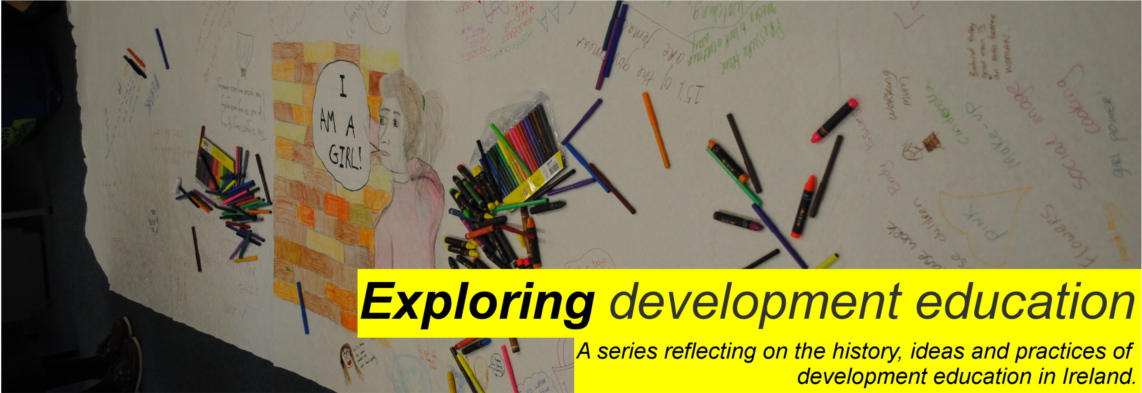The 6 arguments were prepared by developmenteducation.ie as a discussion document toward the review of the Irish Aid Development Education Programme being conducted by GENE (Global Education Network Europe) taking place in 2015 and was circulated at the consultation event at Farmleigh House (Dublin) on 29th April. The review process is contributing towards Irish Aid’s new development education strategy set for publication in 2016.
………………………………………….
1. Development education needs to firmly remain an integral part of the Development Cooperation movement
The primary concern of development education (DE) remains human development in all its dimensions and is linked directly to the broad ‘aid’ and related agendas; it has a specific and distinct pedigree and it is one that the public relate to readily even when in disagreement. If we lose this focus in favour of something more amorphous and vague, then we weaken our trade and its agenda and we betray our mandate.
DE needs to firmly remain a part of the development cooperation agenda (from which it obtains its relevance and focus) and that of Irish Aid (and Foreign Affairs) or it is in danger of losing its relevance and visibility. If the intrinsic link with development cooperation is weakened or lost (or if responsibility is moved to other (domestically focused Departments), it will be only a matter of time before the specific budget line is also lost. Without development education, development cooperation will also be weakened.
2. DE is a public entitlement and a public agenda and as such needs to be visible
Ensuring development issues remain a part of public debate and public judgement is fundamental in discussing Ireland’s role in the world. Irish people have a right to be engaged in this conversation (they also have a corresponding duty) and therefore the agenda, issues and stories need to be ‘visible’ publicly – they should not be simply hidden in policy documents, syllabi, assessments etc.
DC and DE require a robust programme of public education and debate – it is a key part of the agenda on transparency, accountability and public ownership.
3. The current ‘map’ of DE in Ireland needs re-balancing
While DE in the formal sector has been the priority focus for Irish Aid in recent years, it cannot and should not be the sole focus. There has been a tendency to neglect and significantly under-resource DE in other sectors e.g. youthwork, adult and community education and public education. While continuing to support and extend formal sector DE work, there is a need to re-balance DE to similarly address other sectors of public education. DE cannot be allowed to become primarily a schools or formal education agenda.
4. DE needs to build on past experiences and successes in developing and delivering strategies and priorities
With each review process, there is a tendency to ‘forget or ignore’ history (especially that of previous Irish Aid strategies and their successes/failures and impact) and that the story of DE in Ireland has many experiences and successes upon which to build for the future. Some of the successes are obvious – for example, DE in CSPE, the adoption of the DE agenda by many structures and institutions (NYCI, colleges, networks of schools, the trade union movement, Aontas etc.); others less obvious (for example, DE through popular campaigning – anti-Apartheid, Fairtrade, Baby-milk Campaign etc.). There are many lessons to share and they need to be taken into account in the review.
The history of DE in Ireland does not begin with this review – it needs to build upon the past.
5. DE needs to be appropriately resourced if it is to continue to succeed
There are many viewpoints on what the phrase ‘appropriate’ resourcing might mean – a percentage of current ODA; a specific figure per head of population, sufficient to resource a demographically audited network of key providers regionally etc. What is clear at present is that the ‘visible’ delivery of DE in Ireland is in danger of disappearing given the inadequate levels of funding available (and not just from Irish Aid).
The review should make it clear that any realistic Irish Aid DE strategic plan for the years ahead must facilitate strategic planning by those tasked with delivery. Such planning must inevitably include financial planning in order to ensure quality, impact and, crucially the retention of key experienced personnel. Currently there are many difficulties for DE groups around Irish Aid DE funding (scale, multi-year, contracts, grant calls etc.) which undermine the work – these need to be addressed.
6. Demographics matter – DE planning needs to reflect changing population trends and concentrations
Since the publication of the last Irish Aid strategy the national census was completed and published – another censes is scheduled for 2016. Many assumptions are made about the geographical spread of DE (such the myth of Dublin saturation) without reference to data. DE strategic planning should be actively analysing and responding to demographic changes and trends in terms of provision, adaptation and changing engagement opportunities. Investing in the geography of potential DE is crucial if we are to maximise impact.
There are many issues that a national DE strategy should be analysing, including the rise in population; percentage changes in the population of urban electoral divisions (such as north-west and west Dublin); the rise of new towns; socio-economic household composition; the rise in pre-school and primary age; age profiling of a younger and older population etc.
The review should make it clear that strategic planning for the years ahead should be informed by census-based strategic planning as part of a broader quality, impact and outcomes agenda.
………………………………………………………………………………………………………………………………………….
This blog is part of our series Exploring Development Education reflecting on the history, ideas and practices of development education in Ireland.

